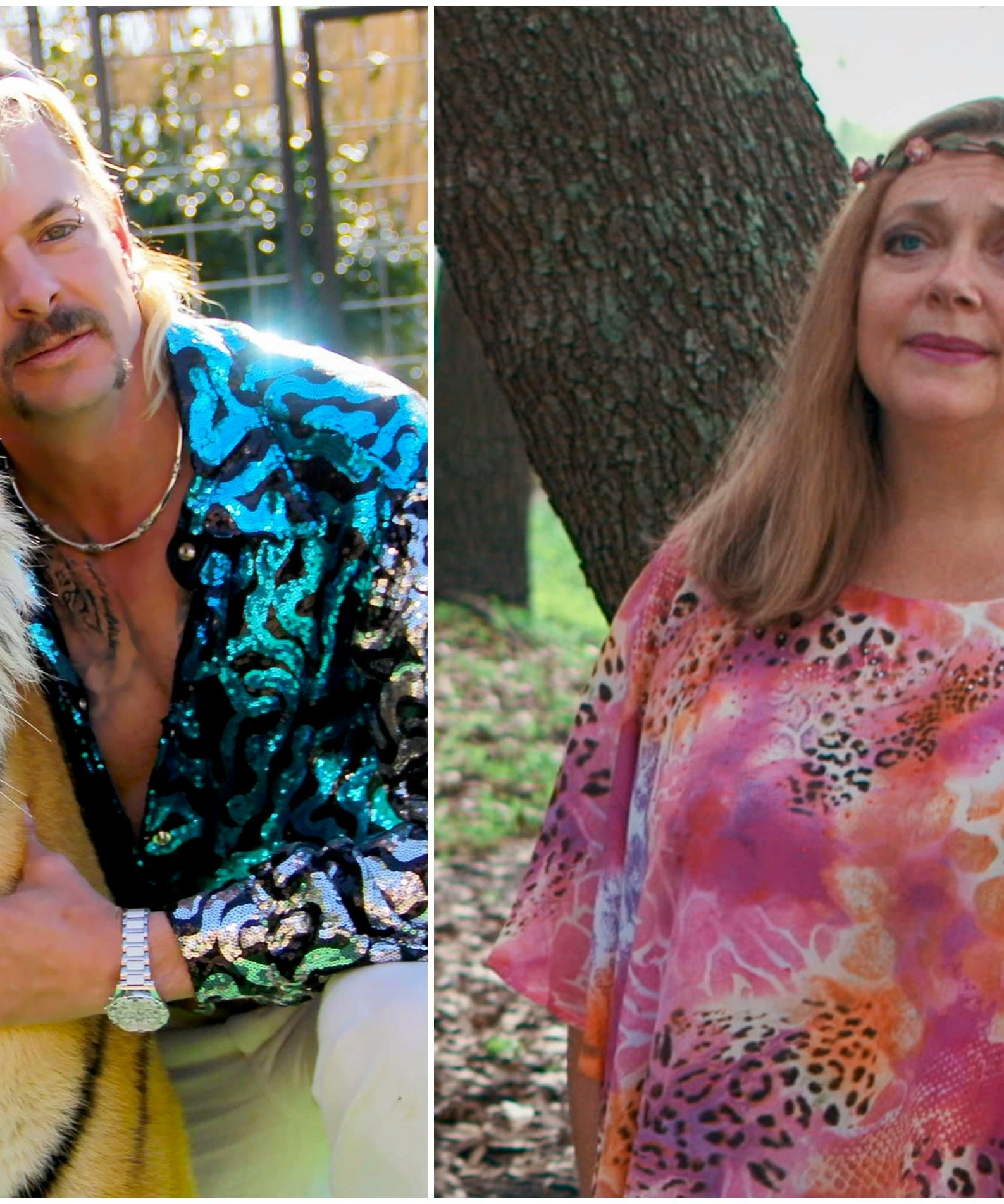Tiger King Is Proof That People Don't Want To Believe Women Are Capable Of Murder
Netflix’s new docuseries “Tiger King: Murder, Mayhem and Madness,” released March 20, has taken the internet by storm. Whether its popularity is due solely to quarantine or to its inherent bizarreness, the series weaves the true story (partly entertaining, mostly disturbing) of controversial zookeeper and local celebrity Joe Exotic and his ruthless feud with big cat rescuer-turned-activist Carole Baskin.

While the series has generated thousands of memes and even Facebook fan pages, it’s also sparked genuine criticism about the exotic animal industry in the U.S. and raised significant questions about the larger-than-life figures it portrays, chief among them: did Carole Baskin kill her husband?
From Philanthropist to Murderer
From the beginning, Carole is presented as the sincere and level-headed, if quirky, alternative to Joe’s obnoxious grandiosity.
Whereas Joe spends his days recording ad hominem takedowns of critics, Carole lobbies Congress for increased protections for big cats and dedicates her days to training volunteers at her Florida-based sanctuary. The two couldn’t be more different, though their clear hatred of each other motivates viewers to pick sides almost instinctively. While Carole seems the obvious pick for the role of heroine versus her dip-dyed, gun-toting nemesis, in the third episode of the series, serious questions are introduced about Carole’s past.
In episode 3, we learn of Carole’s former husband, Don Lewis, a mercurial multimillionaire whom she married in her early twenties. Their marriage is admittedly marked by ups and downs, though Don’s sudden disappearance marks a distinct turn for Carole’s arc in the series. To the astonishment of viewers, this twist leads us to ask: is she a kind-hearted savior of big cats and unfairly targeted by money-grabbing breeders, or is she a gold digger and cold-blooded killer?
Gender Bias in the Justice System
If you ask Joe Exotic and the rest of his allies, Carole killed her husband, no doubt about it, and has yet to answer for her crimes. If you ask Carole, Don Lewis disappeared on a trip to Costa Rica in 1997 and hasn’t been seen since, enabling her to declare him legally dead years later and inherit his wealth.
As the series progresses, it’s abundantly clear that there’s more to Don Lewis’s disappearance than meets the eye, and the clues inescapably point to Carole bearing at least some of the responsibility for his demise. Viewers who are fans of Carole would argue this is yet another attempt by Joe Exotic to damage her name and all she’s done for the community. But among other things, Carole’s odd, misplaced nonchalance and casual attitude on the topic, as well her undeniable benefit from his death, all point to guilt.
If the roles were reversed, we’d have no problem at all believing Joe Exotic murdered his spouse. As viewers of the show and even as a culture at large, it feels like we’re less inclined to believe women can be responsible for the same crimes as men, most likely due to our reluctance to believe that a woman could commit such a heinous act as murder.

However, numerous studies statistically show the widespread gender disparities still prevalent in our criminal justice system. A study from the University of Michigan found that men receive sentences that are an alarming 63% higher than women receive for the same crimes. Additionally, the study found that even if women are arrested or convicted, they’re still less likely to face incarceration. Possible reasons behind this include our traditional perceptions of females as the solely capable caretakers for children (which many single-parent, male-led households prove isn’t necessarily true), making judges more lenient when it comes to sentencing.
Women Can Be Violent Too
If we’re really serious about discussing feminism — and receiving the same treatment as men — we should be acknowledging that women are just as capable of being the perpetrators of violent crimes. Even though we may think of domestic abuse, murder, and sexual assault (to name a few) as overwhelmingly male crimes, women are just as able to abuse, kill, and sexually assault as men are — and they often do. In fact, research reveals that the perpetration of sexually violent crimes by women is actually much higher than we’re all led to believe, yet we’re convinced as a society that no woman could conceive and perpetrate as violent an act as a man.
Which brings us back to Carole Baskin. It’s no secret that her marriage to Don was on the rocks, as admitted by Carole herself, Don’s secretary, his attorney, his daughters, and his previous wife (to be fair, constant extramarital affairs on his part didn’t help). Killing, dismembering a body, putting it through a meat grinder, and feeding it to big cats is both an effective way to get rid of a body and about as grisly and violent a murder as it gets.
You might have heard the old saying, “the simplest explanation is usually the correct one,” and though feeding a dismembered body to tigers is by no means simple, it’s just as probable it happened as compared to the likelihood that Don has been living peacefully in the Costa Rican jungle for the last 20 years.
Reopening the Case?
If Carole is indeed responsible for Don’s demise — and a quick poll of your fellow viewers will no doubt result in overwhelming agreement — it seems as though she’s gotten away with murder in front of hundreds of thousands of people.

It would appear, however, there’s reason to hold out hope after all. Just days ago, the Hillsborough County Sheriff, Chad Chronister, posted on Twitter, asking for anyone with possible leads or tips to come forward, essentially reopening the case of Don’s disappearance. For her part, Carole and her current husband Howard continue to maintain her innocence.
Closing Thoughts
Guilty or not, Carole’s role in the series gives us a better understanding of this monumental disparity in our justice system, as well as the importance of holding perpetrators accountable, regardless of their gender.